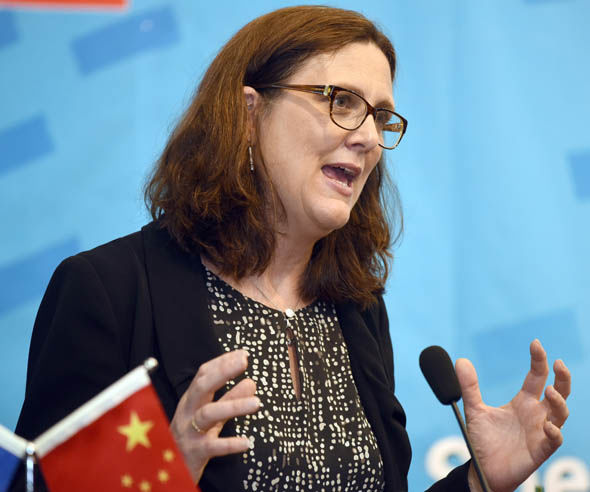Media Report

- Reuters reports that the European Union is ready to join China in fighting protectionism worldwide but Beijing also needs to show it can play fair on trade and investment, the bloc's trade chief said on Monday. U.S. President Donald Trump has threatened to impose punitive tariffs on Chinese imports, blaming China's trade practices for U.S. job losses... "If others around the world want to use trade as a weapon, I want to use it as a tonic, a vital ingredient for prosperity and progress," Trade Commissioner Cecilia Malmstrom told a business conference on EU-China relations, without explicitly mentioning Trump or the United States in her comments."If others are closing their doors, ours are still open - as long as the trade is fair. And we will give China every opportunity to uphold its pledge against protectionism, and towards a multilateral agenda, too," she said...Trade with China was worth one fifth of EU imported goods but only one tenth of its goods exports. Chinese investment flows into the EU rose to a record high of almost 40 billion euros ($42.93 billion) last year, while EU investment into China fell to a 10-year low of less than 8 billion.
- Reuters reports: "China on Monday welcomed U.S. Defense Secretary Jim Mattis' suggestion that diplomacy should be the priority in the South China Sea, and that major U.S. military action was not being considered to contend with China's assertive behavior there. Mattis, speaking in Tokyo on Saturday, blamed China for 'shredding the trust of nations in the region', but also played down any need for U.S. military maneuvers in the disputed waters of the South China Sea and instead called for open lines of communication. The comments, his most complete on the issue to date, came after analysts had said other remarks made by President Donald Trump's administration had suggested the possibility of U.S. military action, or even a naval blockade. Chinese Foreign Ministry spokesman Lu Kang told reporters at a regular briefing that Mattis' emphasis on using diplomatic means of resolving disputes in the South China Sea was 'worthy of affirmation' and that the situation there was normalizing. 'This accords with the common interests of China and all countries in the region, and we hope that countries outside of the region can respect the joint interests and wishes of countries in the region,' Lu said."
- Foreign Affairs comments: "U.S. President Donald Trump did not waste any time keeping his promise to kill the Trans-Pacific Trade Partnership (TPP), an agreement that would have strengthened U.S. economic ties to 11 Pacific Rim nations. However, the common assumption that his decision amounted to handing China an unqualified victory, with the United States' pulling back from global trade leadership and leaving China to take the helm, is an oversimplification. TPP's demise has doubtless provided China an opportunity to build greater influence in Asia...But any celebrations in Beijing may be premature. By turning away from TPP and by threatening a new tariff regime—most recently by floating the idea of a 45 percent surcharge on all imports—Trump laid the groundwork for greater market instability. Formal agreements on trade don't just promote market liberalization. They also represent a broader commitment to play by certain rules—in other words, to behave predictably. Trade deals constrain governments from making the kinds of surprise policy changes that Trump appears to favor. Their benefit is twofold: greater reliability in trade policies and, in turn, less volatility in trade flows."
Calendar
- 2017-02-05 Chinese Luxury Shoppers' Newest Destination: China
- 2017-02-03 U.S.-China War Over Sea Reefs Won’t Happen, Philippines Says
- 2017-02-02 Can Jim Mattis Fix Asia?
- 2017-02-01 China Manufacturing Activity in January Close to 2-Year High
- 2017-01-25 China Can Thrive in the Trump Era
- 2017-01-24 Trump TPP move seen as win for China, but Beijing isn’t celebrating
- 2017-01-23 China Says Prepared to Lead Global Economy if Necessary
- 2017-01-22 Chinese state media hopes for best with Trump, prepares for worst
- 2017-01-20 China’s Economy Grows Strongly, Yet Central Bank Eases Policy
- 2017-01-19 China's First Freight Train To The U.K. Rolls Into London
News
- Reuters China welcomes Mattis' emphasis on South China Sea diplomacy
- The Guardian Vatican defends inviting Chinese ex-minister to organ trafficking talks
- Reuters China protests U.S. sanction list on Iran that hits Chinese firms
- The Financial Times Chinese doctor's dash underlines private healthcare challenges
- The Guardian US-China war would be a disaster for the world, says Communist party
- The Associated Press Chinese Navy Wraps Up Visits to 4 Persian Gulf States
- The Financial Times Overseas Chinese acquisitions worth $75bn cancelled last year
- Bloomberg Apple Is Getting Pushed Around in China By Local Phone Brands
- The Associated Press China Seeks to Show Pope, World Its Organ Program Reforms
- The Wall Street Journal As Bitcoin ETF Nears, Analysts Warn of Trading Frenzy
- The Guardian Vatican defends inviting Chinese ex-minister to organ trafficking talks`
- Bloomberg Foreigners Cut Chinese Bond Holdings First Time Since 2015
- The Telegraph Asia's top banks warn that Chinese capital flight is becoming dangerous
- BBC The pollution-fighting forest buildings coming to China
Commentary
- Foreign Affairs China Will Miss the TPP
- Quartz Donald Trump hasn't spoken with Chinese president Xi Jinping since taking office
- Bloomberg View China's Factories Don't Fear Trump
- The New York Times Why China Is Ripe for the Couch
- Fortune Billionaire's Disappearance in Hong Kong May Be Part of China's Anti-Corruption Campaign
- The New York Times: Opinion Pages Isolating China Doesn't Work
- The Diplomat Is China Open to Talking About Trade With Trump?
